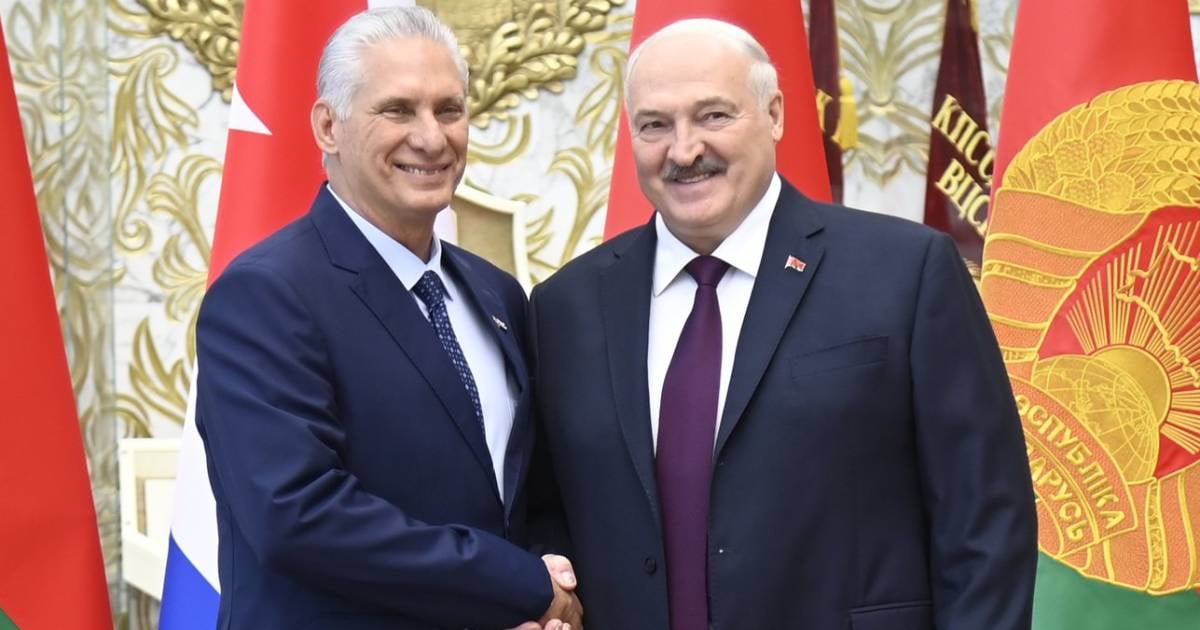During his recent visit to Minsk, the Cuban leader Miguel Díaz-Canel presented a series of symbolic and luxurious gifts to his Belarusian ally, Aleksandr Lukashenko, in an exchange that was broadcast by state television Belarus 1 and has sparked reactions due to the contrast with the reality facing the Cuban people.
The meeting took place on June 25, before the Eurasian Economic Forum, where both leaders discussed cooperation in strategic sectors. However, it was the gift exchange ceremony that drew the most attention on social media and in the news, highlighted a note from the Belarusian state news agency BelTa.
Díaz-Canel, who traveled to the country leading a delegation that included his wife Lis Cuesta, gifted Lukashenko a box of Cuban cigars, one of the most well-known symbols of the Island, carefully presented in a case shaped like a typical Cuban farmhouse.

Gifts from Díaz-Canel to Lukashenko/BelTA
Despite Lukashenko’s admission that he is not a smoker, the Cuban encouraged him to share them with his friends. However, the Belarusian leader surprised everyone with an unexpected response: “No, I will try.”
Additionally, the Cuban president brought him a bottle of traditional rum, another of the country’s identity brands. “I know what Cuban rum is because Miguel gifted me some once. It’s a delicious drink!”, Lukashenko remarked, alluding to a well-established relationship between the two governments.
In a more informal gesture but laden with political symbolism, Díaz-Canel also presented T-shirts specially designed for this visit. As if that weren’t enough, he included gifts sent by Raúl Castro himself, thereby reaffirming the direct connection between the old structures of Cuban power and the Belarusian regime.
Gifts from Díaz-Canel to Lukashenko/BelTA
Por su parte, Lukashenko gifted Díaz-Canel acianos, the national flower of Belarus, and traditional delicacies. “Women love these flowers,” the president noted, in a gesture more symbolic than diplomatic.
Gift from Lukashenko to Díaz-Canel/BelTA
The exchange did not go unnoticed in official media nor among critics of Castroism, who see in this scene not only a display of friendship between two governments marked by human rights violations but also a reflection of the disconnect between the power elites and the realities experienced by their people.
Gift from Lukashenko to Díaz-Canel/BelTA
Lukashenko has stated on previous occasions that both nations, united by Western sanctions and authoritarian visions of government, have identified “promising” areas of cooperation, including the food industry, joint agricultural machinery production, biotechnology, mining, energy, and the healthcare sector.
Therefore, it was not surprising to hear him express his desire to meet with Raúl Castro in Havana “and visit Fidel with him,” reported the Belarusian agency sb.by. “He holds you in high regard,” emphasized the Cuban leader.
In Belarus, the Cuban leader arrived on a Venezuelan aircraft and participated in the summit of the Supreme Council of the Eurasian Economic Union (EAEU), a regional bloc that includes Russia, Belarus, Armenia, Kazakhstan, and Kyrgyzstan.
In the statement, the Cuban leader proposed the creation of a logistics center in Cuba to distribute goods from member countries of the EEU to Latin America and the Caribbean.
Díaz-Canel advocated for the idea as an opportunity to enhance the export potential of the EAE countries and attract foreign investments to the island, at a time when the Cuban economy is experiencing one of its deepest crises in decades.
On June 27, back on the Island, Díaz-Canel shared an image on the airport runway alongside his entourage, expressing gratitude to Lukashenko and the member countries of the EAEU for their hospitality during his stay. In his message, he promised to continue “strengthening dialogue and exchange.”
Frequently Asked Questions about Díaz-Canel’s Visit to Belarus and His Relationship with Lukashenko
During his visit to Belarus, Díaz-Canel gifted Lukashenko a box of Cuban cigars, a bottle of traditional rum, and t-shirts specially designed for the occasion. These gifts symbolize the relationship between the two countries, although they have sparked criticism due to the contrast with the conditions faced by the Cuban people.
The main goal of Díaz-Canel’s visit to Belarus was to strengthen bilateral relations and advance new economic agreements. During his stay, both leaders discussed cooperation in strategic sectors such as food industry, biotechnology, energy, and healthcare.
While Díaz-Canel participates in official visits and international agreements, Cuba faces a severe energy crisis and growing social discontent. Blackouts of up to 24 hours, shortages of food and medicine, and rampant inflation are part of the reality that Cubans are experiencing, which has generated criticism regarding the priorities of the Cuban government.
The relationship between Cuba and Belarus is viewed as a strategic alliance between two authoritarian regimes facing international sanctions. This cooperation takes place within a context of international isolation and aims to strengthen the position of both governments against their opponents and Western sanctions.
